
The state of plastics
Many Co-op owners and shoppers have shared their interest in reducing plastic usage in the store. From bioplastics, to compostable plastics to recycling options, the Ashland Food Co-op continues to research what works best as we move towards our goal of being a zero waste store. Here is where we stand.
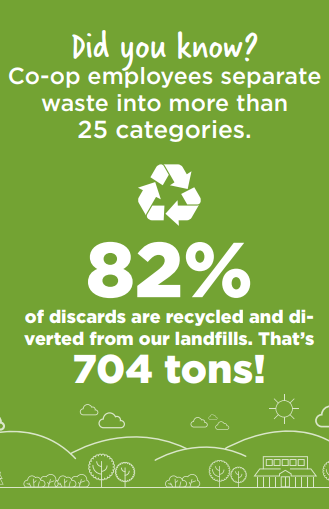
Right now, there is a trade-off in terms of food and plastic waste. Plastic is extraordinarily unique in its ability to preserve food and prevent spoilage and waste. But the trade-off is its very long lifespan.
Reducing plastic waste - by using alternative storage materials, or going package-free when possible - results in more food spoilage and waste, which can sometimes have a bigger ‘carbon footprint’ than plastic use alone.
The best way to summarize: as of March 2019, no perfect solution for plastic alternatives exist.
This isn't meant to make excuses for waste - as you may know, we already divert over 80% of our waste from the landfill. But it is important to know where things stand, and what some of the many decision-making factors are, that go into this debate about containers and plastic. Let’s break it down:
Bioplastics
Bioplastics often come from unsustainable sources - for example, monocropped GMO corn that could be used to feed people, or is grown on the other side of the country and requires a large carbon input to deliver.
As the name implies, bioplastics often have lifespans as long as petroleum plastics - they’re still plastic! The “end of life” assessment for bioplastics is not much better than petroleum plastics. For example, a single-use plastic fork made from GMO corn will still end up in the landfill.
Though there are recyclable and compostable bioplastics, they often require specialized machinery at waste disposal sites to be broken down. Our region does not currently have that infrastructure, and the additional carbon footprint to ship these materials elsewhere can quickly outweigh the ‘bio’ benefits.
The Co-op continues to explore options in this area: more readily compostable bioplastic bags are hitting the market which we will continue to test.
Alternatives to plastic
AFC has brought in cardboard packaging for some produce, like cherry tomatoes and strawberries. And yes, they are completely recyclable!
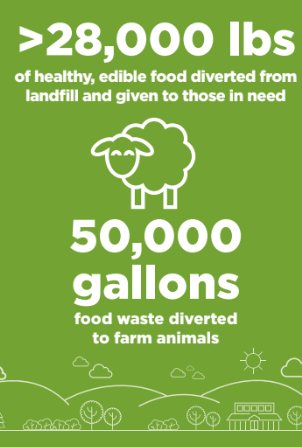
However, it can be difficult for customers to visually connect with the product - can you tell how juicy and ripe those strawberries are through the cardboard? Without that visual connection, a shopper may be hesitant to buy the product, inadvertently leading to more food waste (because the product stays on the shelf longer).
Cardboard also leads to more spoilage because of the lack of light and its ability to carry moisture (leading to molding).
Is generating more food waste an acceptable trade-off to having recyclable and compostable packaging? This is another instance where analyzing production inputs and requirements, instead of just ‘end-of-life’ issues for packaging, gives a better idea of the sustainability of a packaging type.
Plastics recycling
Many plastics are no longer being accepted by local waste management services. Generally, white, rigid plastics (example: yogurt containers) are still being recycled; clear, non-rigid plastics (soda bottles, salsa containers) are not. So buy smart!
Clamshells are a common area of concern. The Co-op is very lucky to be able to recycle plastic clamshells from products that were purchased at AFC. You can bring those clamshells back into the store for recycling. Even better, this recycling is more carbon neutral because the clamshells hitch a ride back to Eugene on existing truck routes (rather than a one-off transit run).
If you're purchasing greens, you can also bring your own container to fill from the bulk spinach and baby greens bins. Alternatively, OrganicGirl salad clamshells are made of 100% recycled plastic.
Our commitment
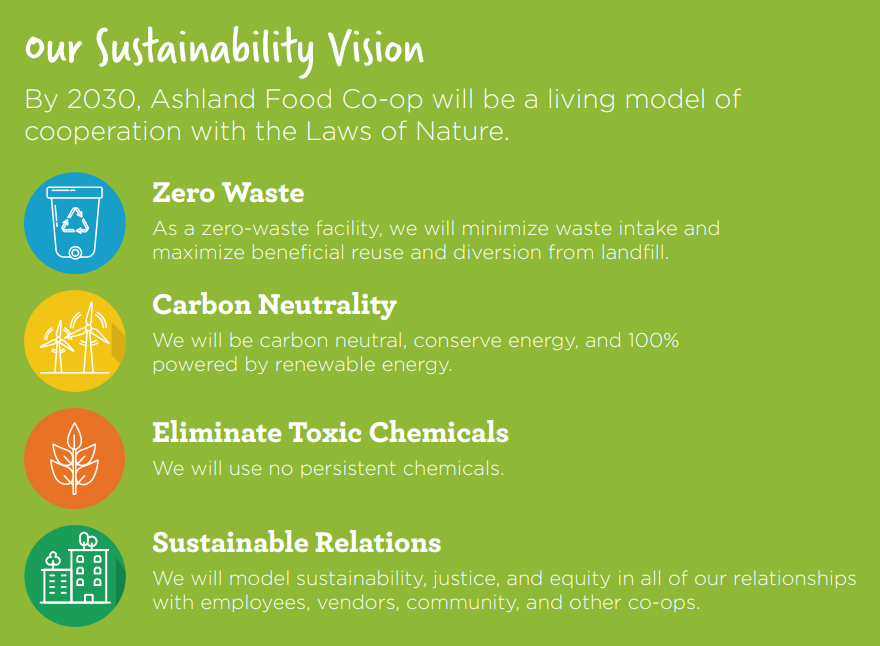
It’s easy to see that with the options available right now, there’s always a trade-off. In our own store and through the National Co-op Grocers network, we continue to look for a solution that is not petroleum-based, non-GMO, and that can be recycled or composted fully. When that solution arrives, we will be ready!
Right now, you should aim to reduce your overall plastic consumption when making purchasing decisions; choose reusable packaging when you do have to purchase plastic (clear salsa packages make great storage for leftovers); and choose recyclable plastic (white plastic and clamshells) if you think you’ll only get one use out of the packaging.
For some additional reading on the topic of plastics and packaging, check out this report put together by the Oregon Department of Environmental Quality.
More Co-op News
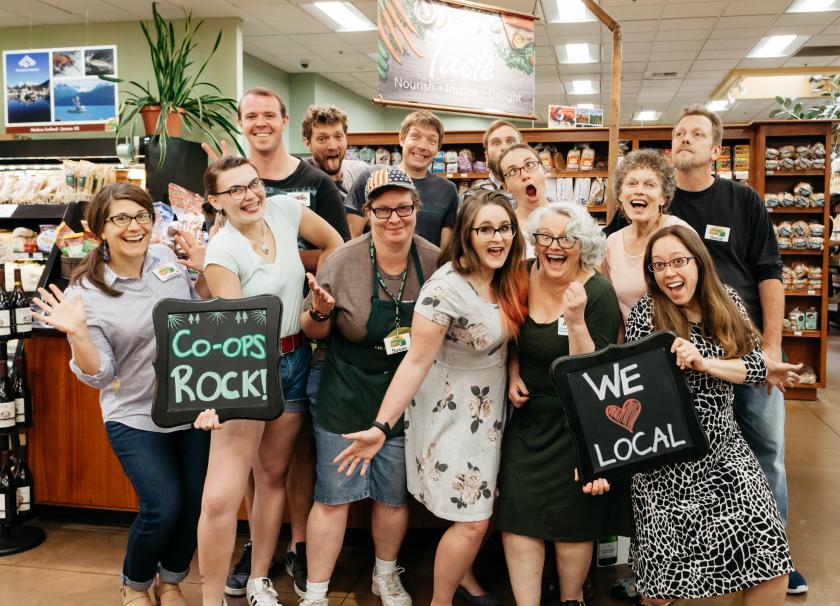
5 Reasons to Love Co-ops
By Laura Pfister, Media Coordinator
October is National Co-op Month, so what’s the big deal? Being a co-op is special. Yes, we know we are biased, but being a cooperative enterprise means we do business differently. We don’t have a single owner living on their private island drinking margaritas all day without a care in the world. We are owned and governed by you, our 10,000 members. We share the burden in hard times and share the benefits in the good times. We put people, the planet and our principles before profit.
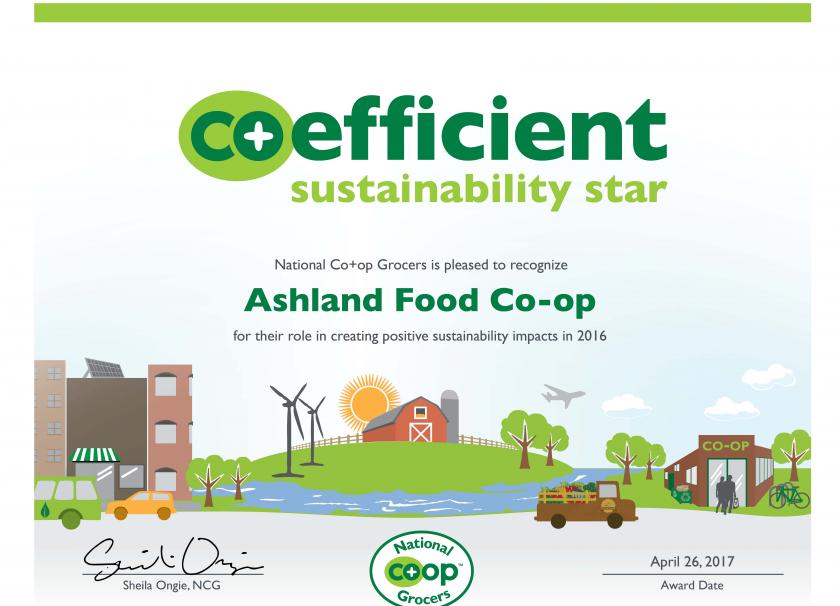
From the General Manager's Desk
By Emile Armarotico
This spring, National Co-op Grocers recognized Ashland Food Co-op as a Co+efficient Sustainability Star for our excellent sustainability efforts.
Our Sustainability Vision aims at being carbon neutral by 2030. We’ve taken a great stride toward this by installing a 39 kilowatt solar electric system on our rooftop with the capacity to generate approximately 7% of our electricity usage. The cost was partially offset by a $27,000 REAP (Rural Energy for America Program) Grant.
Local Starts at the Co-op
When we say local, we mean local. We source our local goods from within 200 miles of the store. By purchasing goods from local producers, we aim to create and maintain a healthy local economy and support family farms. What could be better than helping your community by buying local goods?
With all the local products that we offer, it’s hard to pick a favorite. But that’s exactly what we asked our staff to do. Here are some of their go-to local eats.
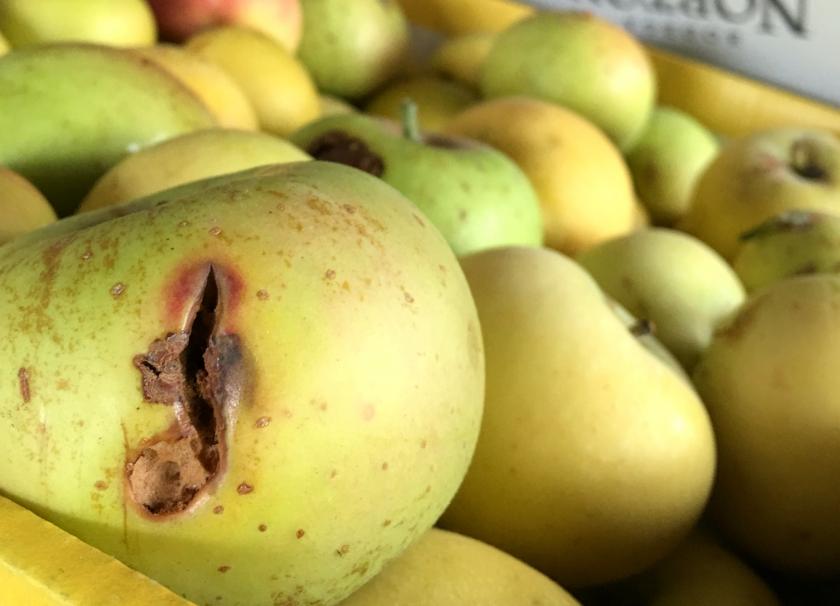
Your Fruit. Your Cider.
How often can you browse the shelf at your neighborhood grocery store, see a bottle of hand crafted, local cider and say, “Hey, I help make that!” Well, at the Co-op you can.
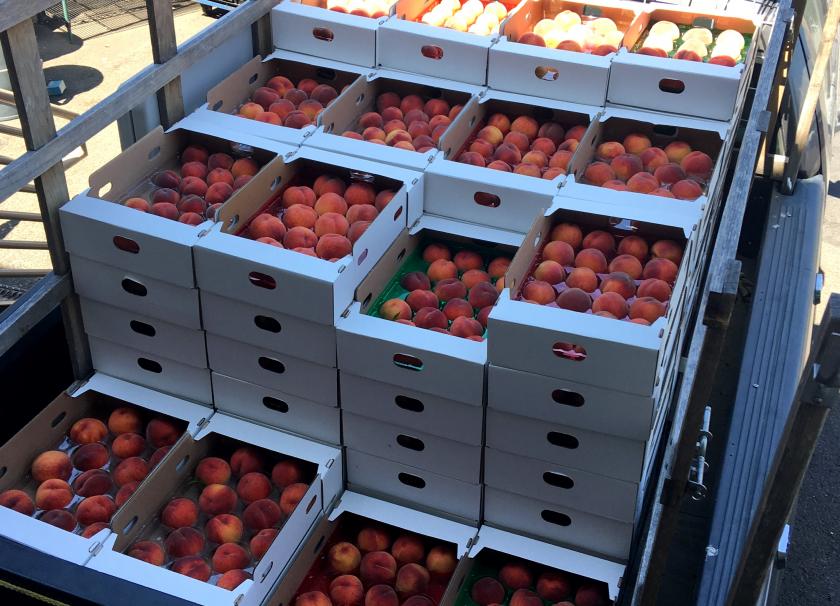
Millions of Peaches, Peaches for Me
By Laura Pfister, Media Coordinator
Many of us wait all year for this moment. We spend the winter months dreaming of a certain fuzzy stone fruit, its sweet juices dripping from our face and the buttery golden pie crust those yellow-orange slices will inhabit.
Good news! The wait is over. That local, sweet orb of sunshine has finally arrived. That’s right. Rolling Hills peaches are here!

2017 Board Election Results
We're Sustainability Stars!
Deep in our hearts we've always known we were sustainability stars, but now we have an award to prove it.
We recently received a Co+efficient Sustainability Star award from National Co-op Grocers (NCG) recognizing our positive environmental and community impacts.
Co+efficient, NCG’s sustainability program, measures social, environmental and local economic impacts from participating food co-ops across the country.
Give Where You Live
It’s the most wonderful time of year! Yes, we know that phrase is generally reserved for the holiday season. But for us, this truly is the most wonderful time of the year. It’s OUR season of giving.
Dine In and Bike Your Way to Savings
Did you know that approximately half of our landfill waste stream is composed of Deli trash? A significant part of that is “to-go” containers, which are sometimes used for dining in and don’t end up “going” very far at all.
Sustainability matters in everyday actions and we want you, our customers, to help us reduce unnecessary waste and make the most ecologically sound choices possible.
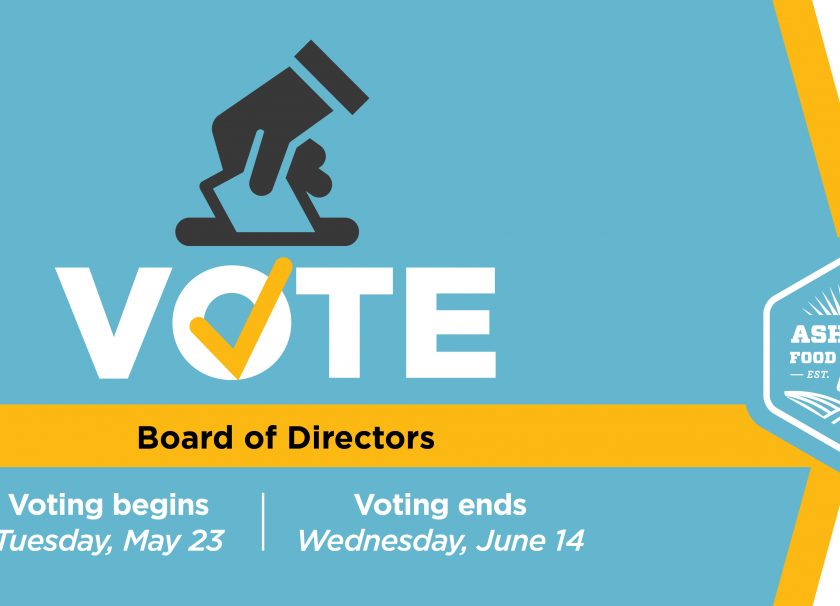
Participate in YOUR Co-op!
Spring Picks
The sun is (mostly) out and the weather is finally getting warmer. That must mean summer is right around the corner, right? We sure hope so. We’re ready to grill, soak up some sun and enjoy the many fruits and vegetables that are in season. Our Floral Coordinator, Rachel Chastain, shares some of her favorites.
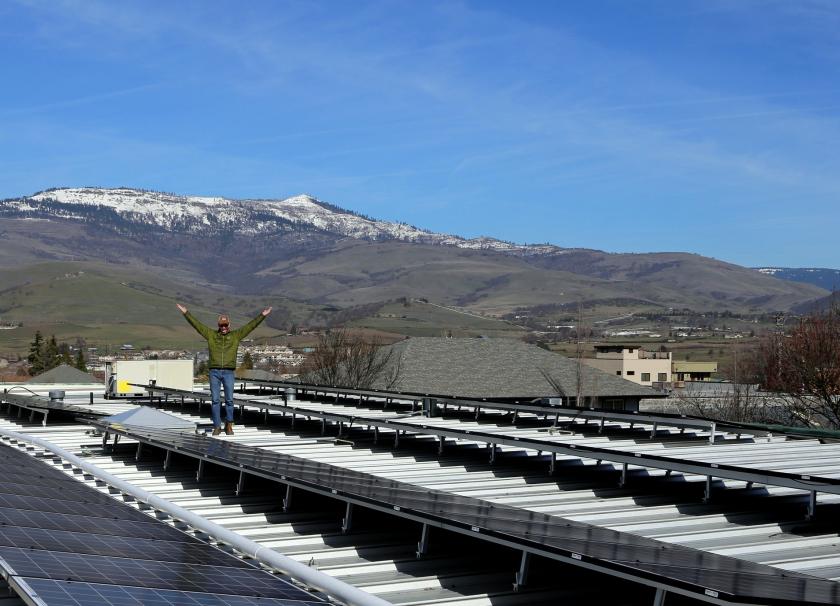
Be the Sustainable Change
By Laura Pfister, Media Coordinator
Sustainability is not a new concept at the Co-op. It has always been part of our DNA. We’ve been using sustainable business practices before it was the “cool”, “responsible” thing to do. In fact, the Co-op was founded 45 years ago largely on the principles of sustainable, local organic food production as an alternative to modern industrial agriculture.
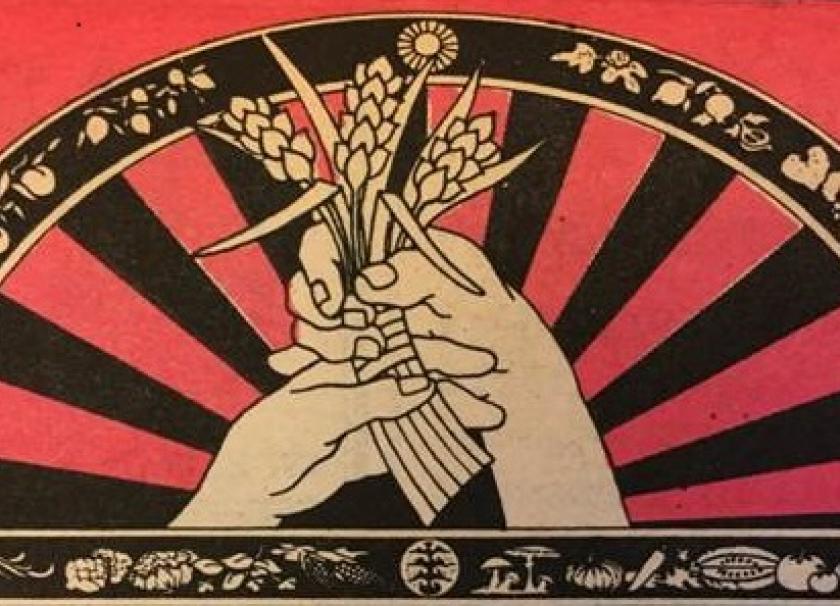
A New Look
By Laura Pfister, Media Coordinator
For 45 years we’ve been loving local and fostering community. Throughout our almost half a century history, our identity and logo has gone through many iterations.
Some of you might remember the logo above from our newsletter in the early 1980s.
As we’ve done multiple times throughout our history, it’s time to refresh our brand and launch a beautiful, new logo to take us into the next decade.
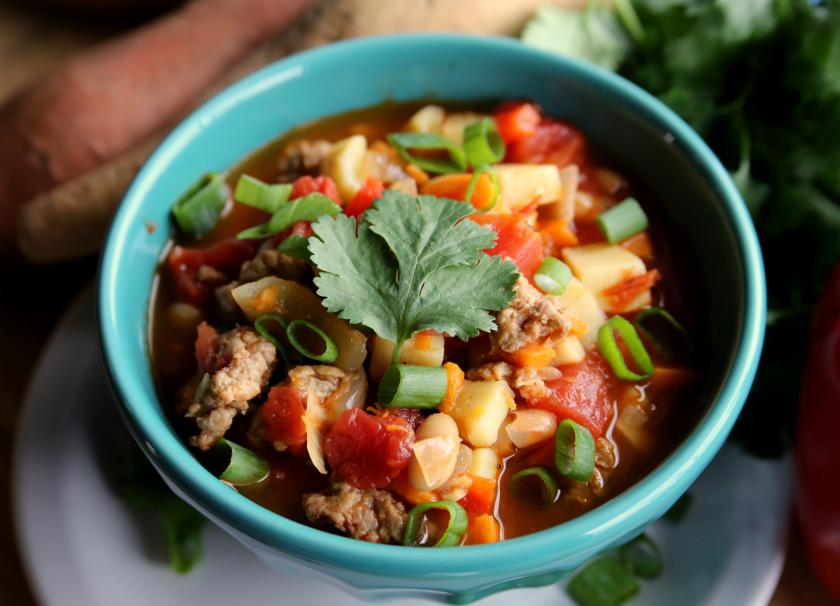
Turkey and Sweet Potato Chili
Turkey and Sweet Potato Chili is one of my favorite Co+op Basics recipes. It is full of flavor, color and shatters the myth that a healthy meal has to cost a fortune and take all day to prepare. This recipe is also a clever way to use sweet potatoes, which are not only tasty but high in fiber and vitamin A.
Looking to Save Money at the Co-op?
By Laura Pfister, Media Coordinator
We hear from time to time that people feel the Co-op is higher priced than other stores. In the past, we may have earned this perception. But not anymore. We took a long, hard look at ourselves and we talked with other Co-ops across the country. Together, we are pooling our resources to bring you organic, household staples at everyday competitive, low prices. Welcome to Co+op Basics.
